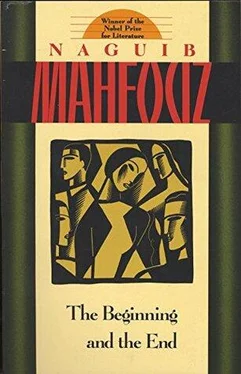Naguib Mahfouz - The Beginning and the End
Здесь есть возможность читать онлайн «Naguib Mahfouz - The Beginning and the End» весь текст электронной книги совершенно бесплатно (целиком полную версию без сокращений). В некоторых случаях можно слушать аудио, скачать через торрент в формате fb2 и присутствует краткое содержание. Год выпуска: 2016, Издательство: Anchor Books, Жанр: Классическая проза, на английском языке. Описание произведения, (предисловие) а так же отзывы посетителей доступны на портале библиотеки ЛибКат.
- Название:The Beginning and the End
- Автор:
- Издательство:Anchor Books
- Жанр:
- Год:2016
- ISBN:нет данных
- Рейтинг книги:4 / 5. Голосов: 1
-
Избранное:Добавить в избранное
- Отзывы:
-
Ваша оценка:
- 80
- 1
- 2
- 3
- 4
- 5
The Beginning and the End: краткое содержание, описание и аннотация
Предлагаем к чтению аннотацию, описание, краткое содержание или предисловие (зависит от того, что написал сам автор книги «The Beginning and the End»). Если вы не нашли необходимую информацию о книге — напишите в комментариях, мы постараемся отыскать её.
The Beginning and the End — читать онлайн бесплатно полную книгу (весь текст) целиком
Ниже представлен текст книги, разбитый по страницам. Система сохранения места последней прочитанной страницы, позволяет с удобством читать онлайн бесплатно книгу «The Beginning and the End», без необходимости каждый раз заново искать на чём Вы остановились. Поставьте закладку, и сможете в любой момент перейти на страницу, на которой закончили чтение.
Интервал:
Закладка:
Pained by the man’s words, Hussein kept his eyes lowered for a long time. “I’m extremely sorry,” he said in a feeble voice. “We’re all sorry. Our only wish is to preserve our old affections.”
Silence prevailed, until Farid Effendi murmured coolly, “You were never deceptive in your dealings with us.”
Still tense and worried, Hussein recalled with an agitated heart the decision he had made before his arrival. He wondered whether now was the right time to declare it. Although Farid Effendi’s attitude was not encouraging, Hussein refused to put it off any longer. Looking at the man with searching eyes, he inquired, “May I see Miss Bahia?”
The man violently waved his hand. “What for?” he queried. “Leave her alone. Under the circumstances, this is the only thing to do.”
Moved, Hussein wondered what the poor girl might be doing and how her tender nature would receive the shock. What should he do himself? Should he proceed or withdraw? Wouldn’t his words sound ridiculous in this electrified atmosphere? But he had a deep-seated feeling that if, at this particular moment, he allowed himself to retreat, he would never carry out his plan. Dispelling his hesitation with a deep sigh, he attempted to conceal his confusion.
“Sir,” he said with apparent calm, “I don’t know how to express my feelings. Nor do I pretend that I’ve chosen a suitable time for expressing them. But I can’t help saying a final word in this matter; that is, I hope one day you’ll bless my honest desire to ask for your daughter Bahia’s hand.”
Astonished, the man’s eyes opened wide. He appeared to have expected anything but this proposal. He seemed anxious, but unable to speak, whereas Hussein, having survived the climax of his confusion, recovered a degree of his calm.
“Don’t imagine,” he said, “that my request results from a feeling of guilt over my brother’s behavior. Nor is it from pity for Miss Bahia. No. I swear this isn’t the case. My own, my independent, unconditional desire grows out of my esteem for your daughter and yourself.”
Farid Effendi’s astonishment continued. Hussein found courage and warmth in his silence as well as in his own volubility.
“Only one thing disturbs me about this request,” Hussein went on. “Perhaps I’m not her equal.”
Breaking his silence for the first time, the man murmured, “Don’t belittle yourself, Hussein Effendi. You’re like a son to me.”
“Thank you,” Hussein said, flushing.
Perplexed, the man pondered for a while. “I should thank you for this request,” he said. “God only knows how much it would please me to see it fulfilled. But, you know, this isn’t the proper time to discuss it.”
“Sir, this is quite natural,” Hussein said with enthusiasm. “I can wait until the proper time comes.”
With this remark, their conversation came to an end.
EIGHTY-ONE
Deeply absorbed in his thoughts, Hussein returned to Heliopolis. On his journey from Farid Effendi’s flat, he reviewed once more a long stretch of his forgotten past as he had in the coffeehouse. Despite his perplexity, Hussein experienced hope and pleasure he had never known before. Formerly, he had been in love with Bahia. But this love was nipped in the bud and nothing remained of it in his prudent, faithful heart except an image of her as the ideal of the good wife. He remembered how much he had patiently suffered. From his frustrated love, he had learned that, with a measure of wisdom, it was possible to derive lofty, sublime pleasures even from pain itself. He came out of this experience with a tranquil heart and a serene smile on his face. He was consoled and his suffering relieved by the thought that confronting the misfortunes of life with patience and forbearance was a golden road to good fortune. Now his old, buried love had revived in his heart as if it had never died out for a single moment. Thus he set out in a kind of ecstasy, and finally reached home. He found them all waiting for him. At once they exclaimed, “What happened?”
To prepare them for his strange piece of news, he thought it best to exaggerate the gravity of the situation. Sorrowfully wringing his hands, he said, “They were so distressed that, in shame, I kept to myself. And for the first time in my life I saw the peaceful, meek Farid Effendi in a rage of blind fury.”
“Tell me everything that happened,” the mother said sorrowfully. “Did you meet Bahia’s mother?”
“No, I only met the man. Before I opened my mouth, he lashed out at me with a storm of reproofs.”
Hussein repeated the man’s words, omitting his biting accusations but adding all the paraphernalia of pathos to stir their sorrow and sympathy. Except for Nefisa, all were moved, sullen, and ashamed. “You shouldn’t have gone to see them tonight,” Nefisa said. “Anyhow, the responsibility for the first mistake lies with the man who accepted a schoolboy as his daughter’s fiancée. Then all his guile in bringing the engagement about. As I see it, Hassanein isn’t to blame. As I said, he was only an inexperienced schoolboy, ignorant of the ways of the world.”
Determined to finish what he had to say, Hussein spoke calmly to his sister. “Please speak kindly of the girl. She might be your other brother’s fiancée.”
Astounded, they all stared at him. Nefisa gave a quick sigh and Hassanein inquired, “What are you talking about?”
Exerting all his willpower to control his confusion, Hussein said, “She may be my fiancée.”
“Yours!”
“Yes, mine.”
“Nonsense!” Nefisa cried.
“But it’s the truth, pure and simple.”
“Did you really ask for her hand?” his mother asked, studying his face.
“Yes, I did,” the young man said, lowering his eyes. “I told him it would please me greatly if he would approve my request for her hand.”
“Did you do this to repair the damage?” Hassanein asked with worry in his voice.
Hussein hesitated briefly. “Partly so. But I have a deep appreciation for the girl, and since marriage is inevitable, I believe she is the right wife for me.”
“Who told you that marriage is inevitable?” Nefisa asked sarcastically.
“What did Farid Effendi say?” the mother interrupted.
Answering on Hussein’s behalf, Nefisa said, “He said, ‘You’re most welcome.’ ”
Indifferent to her, Hussein replied, “He thanked me but said he was sorry he couldn’t approach the girl at this moment. So he asked me to give him time.”
“Did you mean to do this when you left us?” Hassanein asked.
“No,” Hussein said.
“I’m afraid,” the other young man said, “that you may discover later on that you don’t really want to marry her.”
“May this come true!” Nefisa said with a sigh.
“Nefisa!” her mother shouted at her angrily.
Speaking to his brother, Hussein said, “By temperament, I’m inclined to the stable life.”
“I wish happiness to you both,” Hassanein said with relief. After a pause, he added in a low voice, “I have my hopes, too; that is, to marry the daughter of Ahmad Bey Yousri. Brother, do you think that’s foolish?”
“Why not?” Hussein said with a smile. “You’re her equal.”
Somewhat excited, Nefisa said with a laugh, “May God help us. We wanted to get back one of you two, but most probably we shall lose you both. What is happening to us is the mischief of an evil eye.”
“May God bless you,” the mother murmured calmly. “I’m confident my sons will not forget me.”
“Then you’re quite ignorant of marriage and its secret distractions,” Nefisa said to her mother. “I know all about it.”
“Mother knows more about it than you do,” Hassanein said, laughing.
Читать дальшеИнтервал:
Закладка:
Похожие книги на «The Beginning and the End»
Представляем Вашему вниманию похожие книги на «The Beginning and the End» списком для выбора. Мы отобрали схожую по названию и смыслу литературу в надежде предоставить читателям больше вариантов отыскать новые, интересные, ещё непрочитанные произведения.
Обсуждение, отзывы о книге «The Beginning and the End» и просто собственные мнения читателей. Оставьте ваши комментарии, напишите, что Вы думаете о произведении, его смысле или главных героях. Укажите что конкретно понравилось, а что нет, и почему Вы так считаете.












